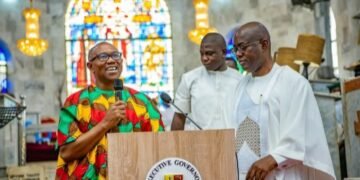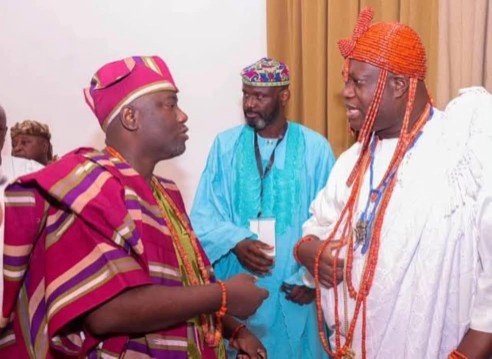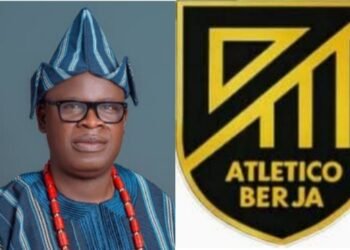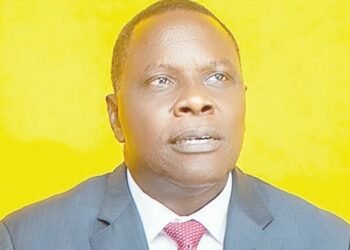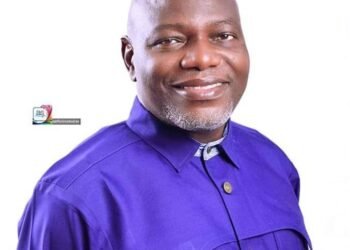“The time has come to bury the hatchet, not in sand, but in history itself. The title of Okanlomo, either Oodua or of Yorubaland, should be an unifying factor, rather than a contentious issue between the Alaafin of Oyo and the Ooni of Ife.“
When the Ooni of Ife, Oba Enitan Adeyeye Ogunwusi, last weekend, made public his decision to install business mogul, philanthropist and Chairman/CEO of Ilaji Groups, Chief Dotun Sanusi, as the Okanlomo Oodua, the foremost Yoruba traditional ruler may not have known that he will be reigniting the age-long rivalry and battle for supremacy between the Oduduwa Throne (represented by the Arole Oodua) and the Alaafin of Oyo Stool.
Barely 24 hours after the announcement by the Ooni, Alaafin of Oyo, Oba Abimbola Akeem Owoade, lived up to expectations as he, seething with unconcealed anger, issued a press release on Monday, declaring that Oba Ogunwusi committed a sacrilege by usurping his (Alaafin) sole right to installing individuals with chieftaincy titles carrying the appellate, “Yorubaland”.
A combative Oba Owoade, unfurling his fangs in the release by his media aide, Bode Durojaye, declared: “The attention of the Alaafin of Oyo and Oba Abimbola Akeem Owoade 1, has been drawn to the purported conferment of chieftaincy title of Okanlomo of Yorubaland on a business tycoon, Dotun Sanusi, by the Ooni of Ife, Oba Enitan Adeyeye Ogunwusi.
“The conferment of chieftaincy title which bothers on Yorubaland by the Ooni of Ife is an affront to the referred institution of the Alaafin who is the Titan of Yorubaland and on who (sic) holds exclusive right to confer any chieftaincy title which covers the entire Yorubaland on anyone.
“The Ooni of Ife is behaving as if there is no authority to check and call him to order and because of that “above the law” syndrome of his, he is in the habit of walking on everybody’s back including the apex court in the country, the Supreme Court, which had ruled on the exclusive preserve of the Alaafin to confer chieftaincy title that covers the entire Yorubaland on anyone.
“The instrument of office presented to Oba Ogunwusi, during his installation, specifically limits his traditional area of authority to Oranmiyan local government which has now been split into three local governments, viz: Ife Central, Ife North and Ife South.
“The dictum that nobody is above the law of the land is now being put to a crucial test and the reality of our time makes it very obligatory for the Alaafin to call the Ooni of Ife to order and demand revocation of the so- called Okanlomo of Yorubaland chieftaincy title conferred on Engineer Dotun Sanusi within 48 hours or face the consequences…”
While tension mounts on what may be the likely consequences of the 48-hour ultimatum, which expired on Wednesday, the Ooni of Ife, in his trademark calmness, played the dumb by refusing to be drawn into any confrontation with his counterpart in Oyo. That singular act attracted greater admiration for Oba Ogunwusi.
Nevertheless, the media aide of Oba Ogunwusi, Moses Olafare, will not let the affront on the Ooni by the Alaafin slide. He took to his Facebook page, the following day (Tuesday), declaring “48-hour ultimatum my foot.”
Olafare, who said the Ooni did not direct him not to respond to the Alaafin on the Okanlomo chieftaincy controversy, further described the 48-hour ultimatum by Oba Owoade as “the Empty Threat of the Alawada Babasala.”
He added: “We cannot dignify the undignifiable with an official response. We leave the matter to be handled in the public court of opinion as it is already being treated. Let’s rather focus on narratives that unite us than the ones capable of dividing us.”
The outburst by the Alaafin of Oyo over the Okanlomo chieftaincy controversy has continued to draw condemnations and flaks from prominent Yoruba people across all walks of life.
Reacting, a renowned journalist, Dare Babarinsa, in what he titled “Silence of the Father”, wrote: “The ultimatum has passed and the Father of the Yoruba Nation is silent. This silence is a loud affirmation of the essence of the centrality of Oduduwa Heritage to Black and African Civilisation. Oduduwa is larger and more relevant today than ever before. Those who are disturbed by that universal reality need to seek for peace with their souls and their ancestors.”
Adeola Soetan, a former prominent Students’ Union leader and activist, wrote on the press statement by the Alaafin: “This public statement from Alaafin of Oyo (who just spent four (4) months on the throne) to Ooni of Ife (10 yrs on the throne) reflects a predetermined, premeditated grumbling and braggadocious anger of the new Alaafin bothering on suspected hidden hatred and undue needless competition or supremacy contest with the Ooni. It can’t be because of a mere non-traditional insignificant chieftaincy title gifted to one man by Ooni which Alaafin considered as trampling on his own exclusive authority.
“If it’s because of the disagreement over the chieftaincy title award, the first paragraph I quoted here is unnecessary, particularly where it says: ‘The Ooni of Ife is behaving as if there is no authority to check and call him to order’.
“How many of such alleged Ooni’s behaviours has Alaafin noticed and reported and how many people’s backs Ooni has walked on as claimed by Alaafin within his four (4) months on the exalted throne? Because he’s always saying that there’s no rift between him and the Ooni, even despite not visiting Ooni to appreciate his presence at his coronation ceremony before traveling far away to Sokoto to appreciate the Sultan of Sokoto for attending his coronation.
“I’m not sure he has done so till today. Bad habit!!!. Alaafin can’t be preaching unity of Yoruba on one hand and his moves on the second hand are suggesting anti-unity…
“That this public statement was issued without a prior telephone conversation with the Ooni as a brotherly-oba by the Alaafin to express his opinion and dissatisfaction on this before coming out publicly to fight Ooni and giving him an ultimatum gives credence to a premeditated anger.
“The 48 hours ultimatum handed over to Ooni by Alafin can be aptly described as mere delusions of grandeur.
“I don’t know what Alaafin was told in Ipebi as one of those few real obas who went through proper Ipebi unlike Oba Igbolabis, but our young royal father sitting on the revered throne of Alaafin needs to calm down and reflects better on his mission and how best to accomplish his vision of a greater throne than he met it than engaging in meaningless competition or supremacy battle overtly or covertly…
“As a Yoruba elder who does not know how to sit on the fence when things are going wrong and cherished values are being destroyed because of patronage or blind loyalty, I want to advise the two young highly-respected traditional kings and reasonable others that the relevance of any oba is the socio-economic development relevance they bring to their immediate community in various ways including youth and educational development of their people and other people.
“Any oba’s relevance today is not about any supremacy war or the number of palace servants in red or white clothes following them with fanfare and noisy distraction at times, not in the number of owambe parties attended, or the number of exotic expensive SUVs in their convoys…”
A group, the Oduduwa Descendants Worldwide, on Friday, issued a statement in which it asserted that the title of Okanlomo Oodua transcends Yorubaland and even beyond the geographical entity called Nigeria.
The group declared: “The lineage of Oduduwa is clear; only the Ooni can designate the Okanlomo Oodua, and any claim otherwise is a distortion of our heritage. Our traditions are rooted in respect and recognition of rightful authority, which resides solely with the Ooni of Ife, a revered figure in our cultural heritage.
“The Oduduwa lineage, revered as the source of Yoruba Culture, has long maintained that the Ooni’s position is pivotal in upholding spiritual and cultural norms. We will not stand by while the integrity of our lineage is undermined.
“The Okanlomo title is not just a title; it embodies the spirit and unity of the Yoruba people, cutting across all Yoruba descendants in Nigeria, Benin Republic, Togo, Cuba, Brazil, America, the UK, and even in Caribbean countries.”
In the midst of the hot tempers, some concerned groups and prominent individuals from Yorubaland, including the Olugbon of Orile-Igbon, Oba Francis Olushola Alao, have urged both parties and their loyalists to sheathe their swords over the Okanlomo chieftaincy controversy and embrace peace.
Many described the press statement issued by the media aide to the Alaafin as a mistake that should be withdrawn. Some others were of the view that gone was the era when empires reigned supreme and tenaciously holding on to a historical antecedent would only be dragging the Yoruba Nation 200 years backward.
Oba Owoade, who ascended the throne as the Alaafin of Oyo, barely four months ago, has come to be seen as a combative traditional ruler who seems to have an axe to grind with the Ooni of Ife. To some people, inferiority complex and an insatiable desire to be at par with his superiors are the main thrust of the anger of the Alaafin.
“Oonirisa is a formidable royal phenomenon that is tirelessly working on the promotion of harmonious existence among the offspring of Oduduwa, but Alaafin Owoade is, most unfortunately, sending a wrong signal across! I only hope that some traditional rulers will not be a black sheep of [the] Oduduwa household,” a commentator said.
Another commentator summed up combative tendencies of the Alaafin thus: “This new Oyo guy came with a predetermined bitterness against someone that loves peace with zero negative energy. That makes it different from the case of their predecessors.”
It may not be out of place situating the raging war over the Okanlomo chieftaincy title in a historical perspective, vis-a-vis the age-long Alaafin-Ooni supremacy imbroglio
The Alaafin–Ooni battle for supremacy: A history
The rivalry between the Alaafin of Oyo and the Ooni of Ife is rooted in the deeper knowledge of the history of Yoruba Civilization.
Ile-Ife is regarded as the spiritual cradle of the Yoruba people, believed to be the place where Oduduwa, the progenitor of the Yoruba, founded the first kingdom. The Ooni, therefore, holds supreme spiritual authority as the custodian of Yoruba tradition, religion, and culture.
However, from the 15th Century onward, Oyo grew into a powerful empire, dominating large swathes of present-day Nigeria and beyond. With its military strength, political organisation, and economic power, the Alaafin of Oyo became the political and imperial head of the Yoruba, overshadowing the ritual authority of Ife.
Clash of authority
While the Ooni maintained his position as the spiritual father of the Yoruba, the Alaafin projected himself as the political overlord. This dual claim created tension over who is the Number One Yoruba traditional ruler.
The British Colonial Administration deepened the rivalry in the 20th Century. Seeking to consolidate Indirect Rule, the British gave the Ooni prominence as the “head” of the Yoruba, partly because Ile-Ife was less politically volatile than Oyo. This sidelining of the Alaafin, once the unquestioned political leader, planted bitterness and competition between both thrones.
Since independence, the Alaafin and Ooni have occasionally clashed symbolically over recognition, protocol, and titles. For decades, their rivalry dominated Yoruba traditional politics. However, recent efforts by prominent Oonis and Alaafins (notably Ooni Adeyeye Ogunwusi and the Alaafin Lamidi Olayiwola Adeyemi III before his death in 2022) have sought to reduce open hostilities and promote Yoruba unity.
While, at first glance, the Alaafin–Ooni rivalry looks like a divisive power tussle, it has also played a key and positive role in shaping the Yoruba society in ways that indirectly promote socio-economic development.
The battle for supremacy between the two foremost traditional rulers in Yorubaland has helped to engender; promote checks and balances in leadership as the Ooni (spiritual authority) and Alaafin (political authority) and thus fostered a more plural leadership system that allowed different Yoruba polities to thrive within their spheres.
The rivalry, albeit unintended, may have also helped in fostering cultural tourism and economic opportunities. Festivals linked to both thrones (Olojo Festival in Ife and Oranyan Festival in Oyo) have being drawing international tourists, researchers, and cultural enthusiasts. These events have continued to generate income through hospitality, trade, crafts, and entertainment.
A rivalry holding Yorubaland back
However, the Alaafin–Ooni supremacy rivalry, on a larger scale, has continued to be a major issue with grave negative potentials that may stunt socio-economic development in Yorubaland
For decades, the Yoruba Nation has prided itself on sophistication, rich traditions, and political awareness. Yet, beneath this proud heritage lies a persistent rivalry- the supremacy battle between the Alaafin of Oyo and the Ooni of Ife- that has done more to distract than to develop. What began as a historical contest for spiritual and political relevance has become a weight dragging the Yoruba backwards in a world that rewards unity and forward thinking.
A rivalry frozen in the past
The Ooni of Ife, revered as the spiritual father of the Yoruba, and the Alaafin of Oyo, custodian of imperial power, symbolise two strands of Yoruba identity. But instead of complementing each other, their thrones have too often been locked in a tussle for recognition: Who receives the first greeting? Who sits higher at state events? Who should be called the Number One Yoruba traditional ruler”? This endless obsession with protocol has left little room for a collective vision of development.
When pride overshadows progress
As noted earlier, there were moments when the rivalry created healthy competition, such as in the colonial era when both thrones courted schools, hospitals, and infrastructure for their domains. But in contemporary global economy, that same competition has turned petty and unproductive. While other traditional rulers across Africa and Asia are leveraging their thrones to attract investment, promote regional unity, and strengthen their people’s bargaining power, the Yoruba are trapped in disputes over ceremonial seniority.
Alaafin-Ooni supremacy battle: A relic stunting development
This battle for supremacy has real consequences. It feeds disunity among Yoruba elites and commoners alike; it weakens collective bargaining power at the centre; and diverts attention from urgent socio-economic challenges. Instead of harnessing their cultural capital to push for investment in education, technology, and regional integration, the Alaafin and Ooni too often retreat into the comfort of ancient quarrels that benefit no one but their immediate courtiers.
Disunity in a time of need
Nigeria is in crisis—economically, socially, and politically. This is precisely when the Yoruba Nation should be speaking with one voice. Instead, the supremacy battle between Oyo and Ife reinforces divisions, creating rival camps among elites and ordinary people alike. The energy that should be channeled into tackling unemployment, insecurity, and economic stagnation is wasted on ceremonial rivalries that add no value to the struggling masses.
Time to bury the hatchet
The rivalry between the Ooni of Ife, and the Alaafin of Oyo is legendary. But today, it represents less of a proud heritage and more of a stumbling block. In a Nigeria crying out for visionary leadership, the supremacy tussle between Oyo and Ife has become a weight dragging the Yoruba backward.
The truth is stark- the Alaafin–Ooni battle is no longer a healthy competition. It is a relic that may further stunt the socio-economic development of Yorubaland. Rather than clinging to outdated claims of superiority, Yoruba traditional rulers should pool their influence to push for regional integration, investment in technology and education, and political leverage in Abuja.
Call for renewal
For centuries, the supremacy battle between Oyo and Ife has shaped the Yoruba identity. But today, it threatens to stunt socio-economic growth. The Alaafin and Ooni once symbolised pride and competition. Now their rivalry risks holding the Yoruba Nation hostage to the past.
Instead of uniting to drive development, traditional rulers in Yorubaland remain trapped in a contest for recognition. The people are paying the price. Colonial manipulation and age-old protocol battles have continued to divide two great thrones—at the expense of Yoruba progress.
The Alaafin–Ooni rivalry is no longer a symbol of prestige; it has become a relic. If both thrones truly wish to honour the Oduduwa legacy, they must rise above ceremonial vanity and forge a united front for Yoruba advancement. History has shown that disunity has cost the Yoruba dearly—from colonial manipulation to missed political opportunities in Nigeria’s subsequent post-independent Republics. The future demands something different: collaboration, not competition.
The Yoruba are a people of immense potential, blessed with a rich cultural heritage and intellectual tradition. But as long as their two greatest thrones remain entangled in supremacy battles, socio-economic progress will remain stunted.
In truth, several reports have it that the present Ooni of Ife, Oba Ogunwusi, has been busy, engaging in various socio-economic activities that could go a long way in restoring the lost glory of the Yoruba race.
Instead of toeing the line of belligerency, the Alaafin of Oyo, Oba Owoade, should embrace peace, and work together with the Ooni and other traditional rulers to fast-track development and promote the welfare of Yorubaland and its people.
The time has come to bury the hatchet, not in sand, but in history itself. The title of Okanlomo, either Oodua or of Yorubaland, should be an unifying factor, rather than a contentious issue between the Alaafin of Oyo and the Ooni of Ife.
•Falade is the Editor-in-Chief/CEO, Newscoven.com


